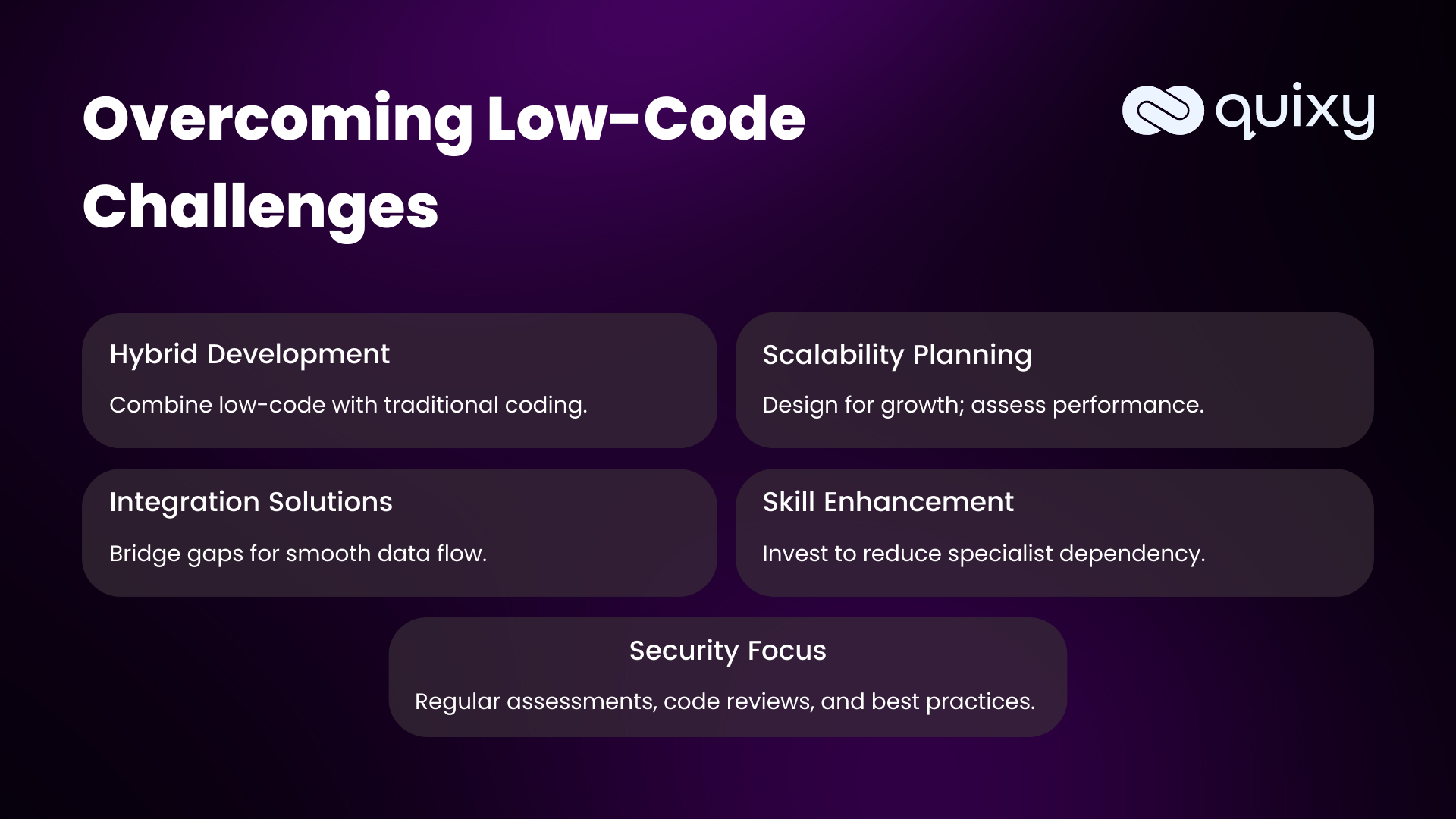
It’s truly astonishing how the landscape of software development is in a constant state of evolution! In their quest for efficiency and speed, businesses consistently seek innovative solutions to streamline processes and deliver outstanding applications. And one such solution that has left us in awe is low-code development. But let’s not forget everything has its own constraints, and low-code development is no exception. Also, the low-code challenges are both a conundrum and an opportunity.
LC development is like the magic wand of software development, enabling organizations to accelerate their software delivery without needing an army of coding experts. Now, let us commence an intriguing exploration through this article. We will be diving into the captivating domain of LC development and will also study the challenges of LC development & strategies devised to surmount them.
The Rise of Low-Code Development
Understanding Low-Code
Before we delve into the challenges, let’s clarify what LC development entails. Low-code platforms empower developers to create applications with minimal manual coding. These platforms offer a visual interface and pre-built components, making it easier for both professional developers and citizen developers to participate in the application development process.
The Appeal of Low-Code
LC development has gained immense popularity due to its ability to accelerate time-to-market, reduce development costs, and foster collaboration among cross-functional teams. It caters to the growing demand for agile software development in today’s fast-paced business environment.
Key Low-Code Challenges

Limited Customization
One of the primary challenges in low code development is the trade-off between speed and customization. Low-code platforms often provide pre-built templates and components, limiting the extent to which applications can be tailored to unique business requirements. Striking the right balance between speed and customization is crucial.
Integration Complexity
Integrating applications with existing systems and databases can be daunting as they become more complex. Low-code platforms must offer robust integration capabilities to ensure seamless connectivity with legacy systems and third-party services.
Also Read: Absolute Guide on Low-Code Development
Security Concerns
Security is a paramount concern in software development. Low-code platforms need to ensure that the applications developed are secure from vulnerabilities and comply with industry standards and regulations. Failure to address security adequately can lead to data breaches and legal issues.
Scalability
For businesses aiming for long-term growth, scalability is a significant challenge in LC development. Applications built on low-code platforms should be able to handle increased loads and adapt to evolving business needs. Ensuring scalability requires careful planning and architecture.
Skillset Dependency
While low-code platforms are designed to be user-friendly, there is still a dependency on developers with specialized skills to address complex issues and perform advanced customizations. Organizations must ensure they have a skilled team in place to harness the full potential of low-code development.
Overcoming Low-Code Development Challenges

Embrace Hybrid Development
To tackle the challenge of limited customization, consider adopting a hybrid development approach. Combine low-code platforms with traditional coding to achieve the desired level of customization without compromising speed.
Invest in Integration Solutions
Address integration complexity by investing in robust integration solutions that bridge the gap between low-code applications and existing systems. This ensures a seamless flow of data and functionality.
Also Read: 10-Step Guide On How to Choose The Right Low-Code Platform
Prioritize Security from the Start
Make security a fundamental aspect of your low-code development process. Regular security assessments, code reviews, and adherence to best practices are essential to mitigate security risks.
Plan for Scalability
When designing applications on low-code platforms, plan for scalability from the outset. Ensure that the architecture allows for easy scalability, and regularly assess performance to identify bottlenecks.
Continuous Skill Development
To reduce skillset dependency, invest in continuous skill development for your development team. Encourage learning and certification programs to empower developers with the knowledge needed to tackle complex challenges.

When is Low-Code the Best Choice for Your Development Needs?
Low-code development is the best choice when you need to:
- Accelerate Development: Low-code platforms enable rapid application development, making it ideal for projects with tight deadlines.
- Limited Coding Expertise: When your team lacks extensive coding expertise, low-code simplifies development, allowing non-developers to participate.
- Prototyping: Use low-code for quick prototyping and testing of ideas or concepts before committing to full-scale development.
- Iterative Development: Low-code supports agile development methodologies, facilitating iterative improvements and adjustments.
- Reduced Costs: For cost-conscious projects, low-code can reduce development expenses by streamlining the process and reducing reliance on highly skilled developers.
- Scalability: It can be an excellent choice for projects that may need to scale quickly in response to changing demands.
- Integration: When integration with existing systems or databases is essential, many low-code platforms offer robust integration capabilities.
- Simplified Maintenance: Low-code applications often require less maintenance, making them suitable for long-term, resource-efficient solutions.
- Cross-Platform Apps: When you need to develop applications for multiple platforms (web, mobile, desktop) simultaneously, low-code can expedite the process.
- Faster Time-to-Market: Low-code’s rapid development capabilities are advantageous when getting your product to market quickly is a priority.
Also Read: Top Benefits of Low-Code Development
🚀 How Quixy Helps You Conquer Low-Code Development Challenges
Low-code platforms are powerful—but they’re not without their challenges. From customization constraints to integration headaches, many businesses face roadblocks when scaling their low-code initiatives. Quixy is built to eliminate those obstacles and empower both IT and business users to innovate without compromise.
✅ 1. Challenge: Limited Customization
The Concern: Many low-code tools restrict advanced logic and UI flexibility.
How Quixy Helps:
Quixy offers full flexibility, customization and dynamic business rules—so you can go beyond the basics and build tailored, enterprise-grade applications with ease.
✅ 2. Challenge: Shadow IT & Lack of Governance
The Concern: When business users build apps without oversight, it can lead to security, compliance, and data consistency issues.
How Quixy Helps:
Quixy enables centralized control with role-based access, approval workflows, and governance dashboards. IT stays in command while business users can still build safely within defined parameters.
✅ 3. Challenge: Integration Complexity
The Concern: Many platforms struggle to connect with legacy systems or third-party tools.
How Quixy Helps:
With its API-first architecture, webhooks, and ready-to-use connectors, Quixy seamlessly integrates with ERPs, CRMs, HRMS, and other systems—no middleware required.
✅ 4. Challenge: Vendor Lock-In
The Concern: Businesses worry about being stuck with one vendor’s infrastructure or proprietary data formats.
How Quixy Helps:
Quixy emphasizes data portability and open standards, allowing organizations to maintain ownership and control of their data and integrations—future-proofing your development efforts.
✅ 5. Challenge: Security & Compliance Risks
The Concern: Data privacy, user access, and regulatory requirements can be hard to manage in low-code environments.
How Quixy Helps:
Quixy is ISO 27001 and SOC 2 certified, offering enterprise-grade security features like multi-factor authentication, data encryption, audit logs, and fine-grained permissions—all built-in.
✅ 6. Challenge: Scalability Limits
The Concern: Some low-code platforms can’t support complex enterprise applications or large user bases.
How Quixy Helps:
Designed for enterprise environments, Quixy supports high-performance workloads, multi-user collaboration, advanced workflows, and global deployments—all on a secure, cloud-native platform.
✅ 7. Challenge: Rigid User Interfaces
The Concern: Predefined templates can limit UI design and responsiveness.
How Quixy Helps:
Quixy empowers creators with a drag-and-drop interface, mobile-friendly design, and custom themes, so every app delivers a seamless, branded user experience.
Quixy bridges the gap between rapid low-code development and enterprise-level demands. Whether you’re building workflows, automating approvals, or scaling internal apps, Quixy ensures you don’t have to choose between speed and sophistication.
Conclusion
Achieving the optimal equilibrium between speed and customization, making strategic investments in integration solutions, prioritizing robust security measures, planning for scalability, and fostering continuous skill development within your team are all paramount steps to fully harness the potential of low-code development.
Bear in mind that success in low-code development hinges upon adaptability, an unwavering commitment to continuous improvement, and a profound understanding of your organization’s distinct requirements. As you embark on your journey into the world of low-code, keep these strategies at the forefront of your efforts to overcome the drawbacks of low-code development and maintain a competitive edge in the ever-evolving software development landscape.
Frequently Asked Questions (FAQs)
Q. What Exactly Is Low-Code Development?
Low-code development is an innovative approach to building software applications with minimal manual coding. It empowers developers to use visual interfaces and pre-built components, significantly expediting the development process.
Q. Why Should My Business Consider Low-Code Development?
Low-code development offers several advantages, including faster time-to-market, cost savings, and enhanced collaboration. It’s an excellent choice for organizations aiming to meet market demands swiftly.
Q. What Are the Key Challenges Associated with Low-Code Development?
Low-code development presents unique challenges such as customization limitations, integration complexities, security risks, scalability issues, and the need for skilled developers. Understanding and addressing these challenges is crucial.
Q. How Can I Ensure Security in Low-Code Development Projects?
Security is paramount in software development. To maintain security in low-code projects, prioritize it from the outset, conduct regular security assessments, implement best practices, and adhere to industry standards and regulations.
Q. Is Low-Code Development Suitable for Large and Complex Applications?
Yes, low-code development can be employed for large and complex projects. However, careful planning for scalability and selecting the right low-code platform are essential to ensure that the applications can handle increasing demands and evolving requirements effectively.
Login
Please login to comment
0 Comments
Oldest















